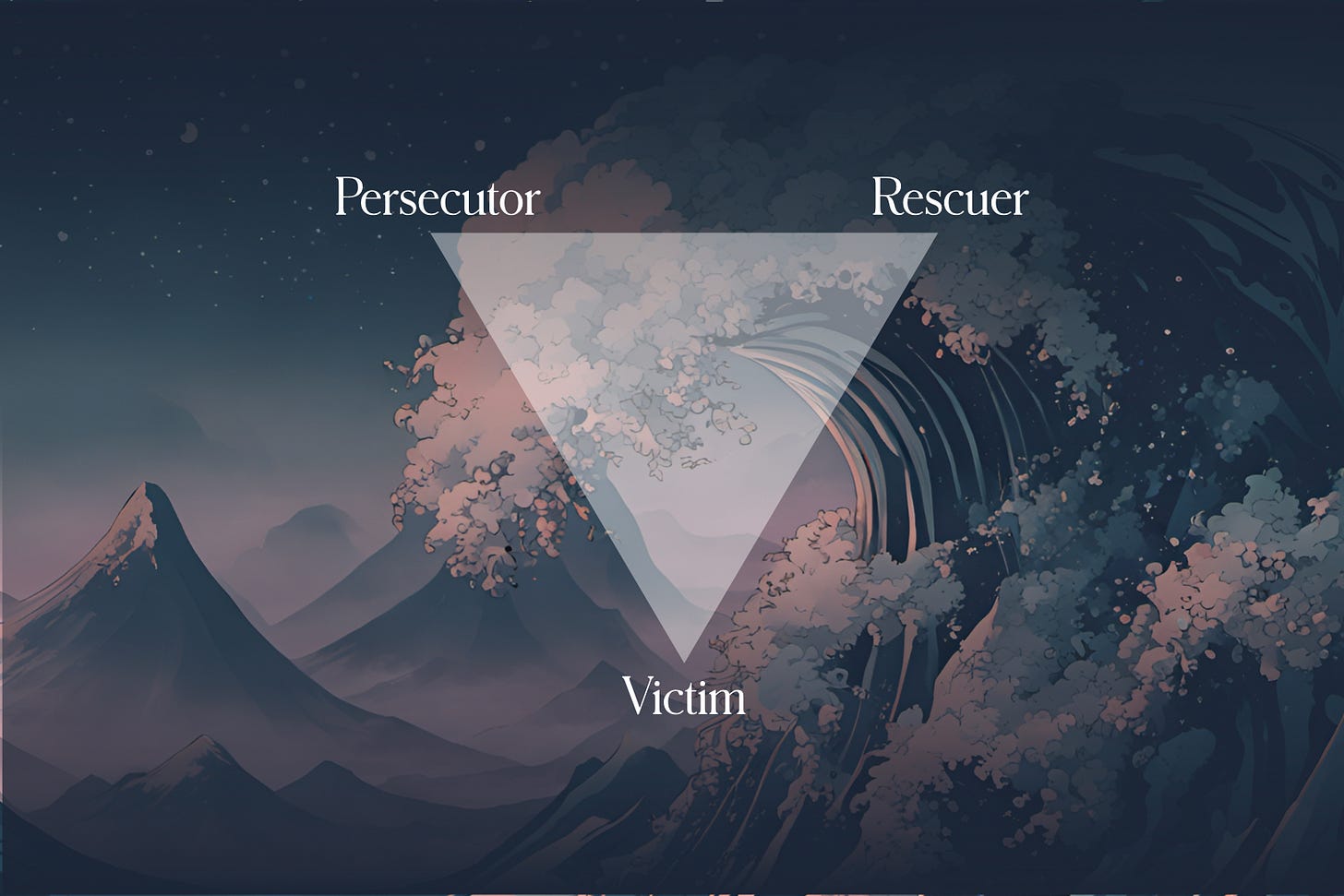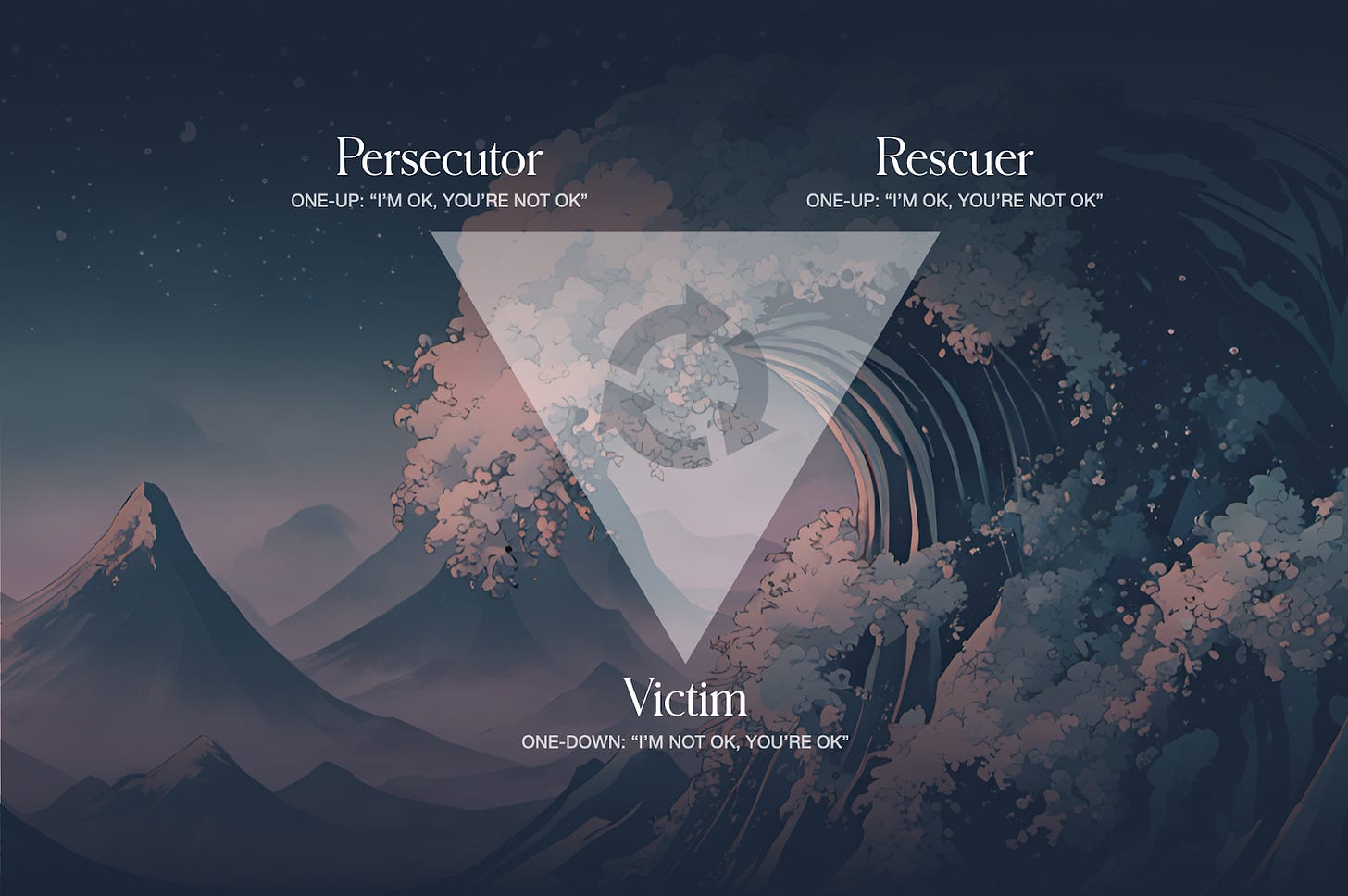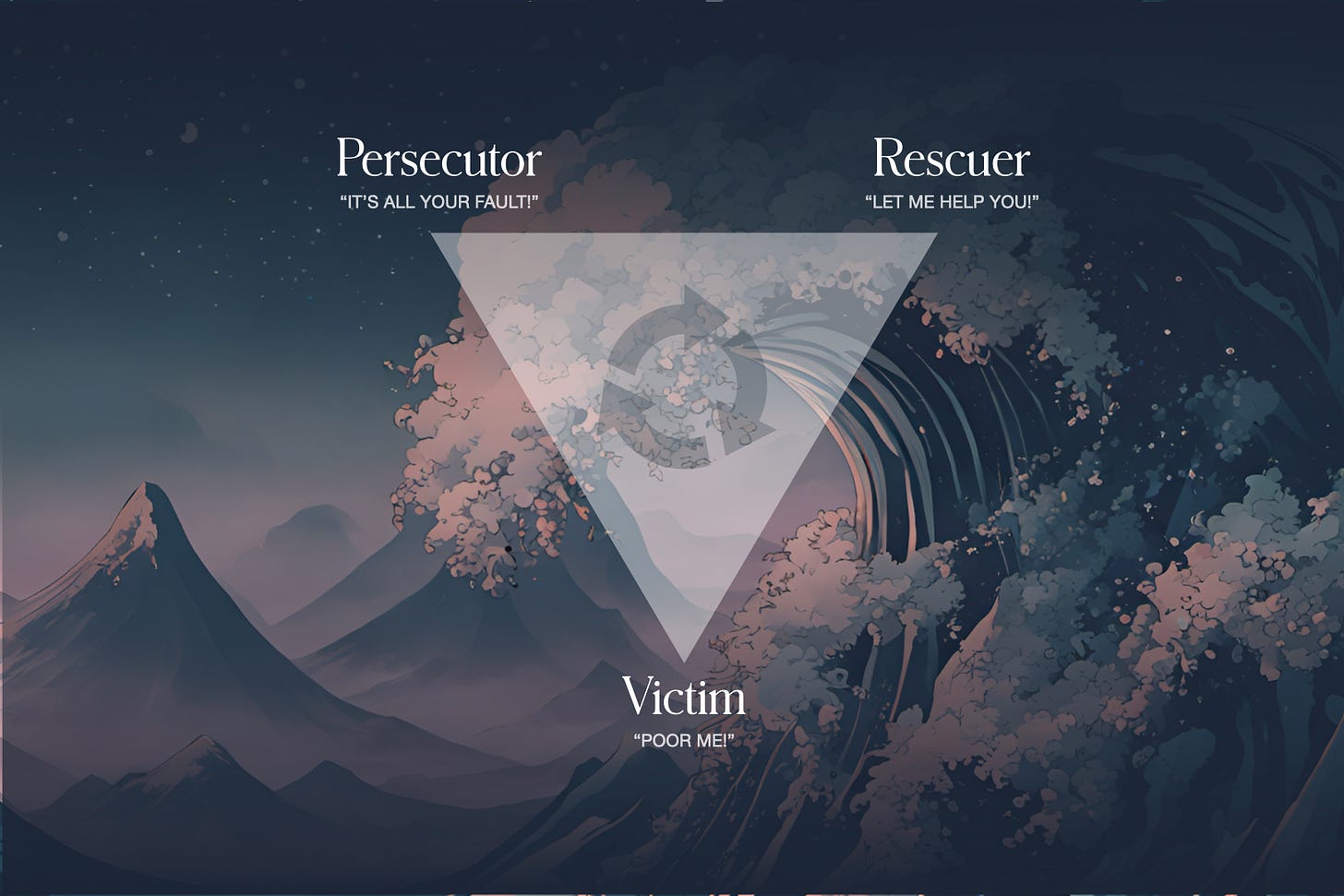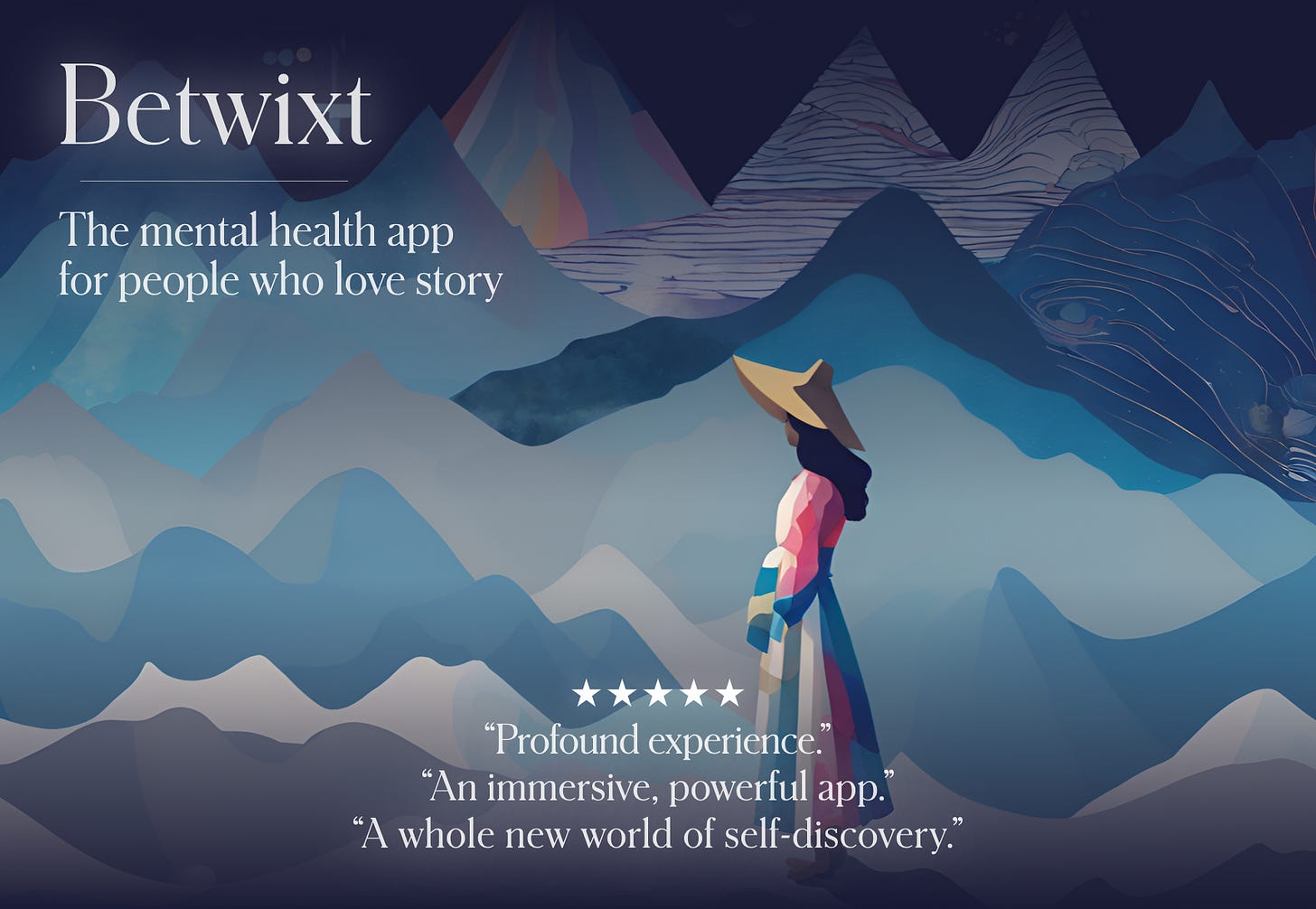How to escape the Drama Triangle
Why you feel stuck in certain relationships and how to reclaim control
You can listen to this post on TikTok or Instagram.
***
Picture this scene: Little George hasn't done their homework. Again. And, upon realising this, their exasperated parent loses their temper and shouts "You're so lazy! You'll never amount to anything!" But George's second parent hears this and jumps in to calm things down. "Leave George alone," they say. "They've been trying hard, but they're just not quite getting it. Give them a break!" Relieved, George goes to stand with parent number two, shoulders slumped, and says "You're the only one who's ever nice to me", which earns them a cuddle. While that's going on, parent number two shoots daggers at parent number one, who shoots them right back and says "You're too soft. They're never gonna learn!"
Who did you identify with most in that little scenario?
Who, if any of them, would you say was making the biggest mistake?
And, most importantly, how do you think this story would end?
We're going to come back to that story in a bit. First, let me introduce you to the Drama Triangle – one of the most life-altering ways of looking at the world that I've ever come across.
The Drama Triangle
The Drama Triangle was developed way back in the 1960s by psychiatrist Stephen Karpman as a model for understanding the power games that people play in conflicted relationships of any kind, including those we might have with another person, a group of people, ourselves, our thoughts, emotions, the object of an addiction. The Drama Triangle is everywhere. Basically any interaction we have, with anyone or anything that makes us feel a bit crap can be described in these terms, which is why you need to know about it.
So grab a notepad and buckle up, because if this is new to you and you don't have an aha! moment in the next 15 minutes, I'll eat my hat.
Start by picturing an equilateral triangle, with one corner, at the bottom, pointing down. This model suggests that whenever people are playing a psychological game, they start by stepping into one of the three roles positioned at each corner of the triangle.
The Persecutor and the Rescuer are at the top in the one-up position and they play the game from the place of "I'm OK, you're not OK". And the helpless Victim, who's in the one-down position at the bottom, plays the game from the position of "I'm not OK, you're OK". In truth, none of them are OK… but we'll get to that.
Now, most people will be most familiar with one of these roles. Your classic playground bully would be most likely to enter into drama through the Persecutor corner, for example, but that doesn't mean they would stay in that role. What actually happens once we enter into drama through one of these three gateways is that we will proceed to cycle through all the roles, probably multiple times. And guess where we always, always end up?
Victim.
This is the great irony because we play this game with the express intention of feeling powerful or taking back control, but no matter how we play it, we will always wind up feeling stuck, powerless, probably resentful and generally not OK. And the worst bit is – we do this ALL the time.
Let's go through the roles one by one to see how they work.
The Persecutor
The Persecutor is the baddy in the scenario. In order to feel better about themselves or in control, the Persecutor will attempt to punish or overpower whoever they see as the victim in the game. This role is all about blame and criticism. But before you start thinking about that evil boss you once had, remember that we all do this, in our own way. Any time you say or think "it's all your fault", you're probably in the Persecutor role.
Examples:
We persecute when we do something to "get our own back", when we snap at people, point fingers, put others down, make judgements or cruel jokes, etc. And also when we attempt to take control by being dominant, issuing demands or acting in a superior way. Taken to the extreme, persecution can take the form of serious abuse; it's not always in this category, but it is always damaging, and not just for the Victim.
If you speak to someone while they're in this role, though, they will not recognise themselves as a Persecutor because, in their mind, they're the one being victimised: to them, the world is a big, bad, dangerous place and they are perfectly justified in their fight for survival.
To put this differently, a Persecutor is NOT a fundamentally bad or evil person, because even the most damaging acts of persecution on the Drama Triangle come from a place that feels like a necessity to the person who's doing them. Having said that, this doesn't excuse the acts themselves and holding Persecutors accountable is important for everyone involved. But we'll get to that in a bit.
The Rescuer
On the surface, the Rescruer looks like the opposite of the Persecutor. They say "let me help you" and they are here to selflessly save the day. The thing is that, just as persecuting is done to make the Persecutor feel OK about themselves, rescuing is also more about making the Rescuer, rather than the Victim, feel OK.
A habitual Rescuer has learned to feel a sense of power, control or self-worth as a result of being the saviour, the good guy. And this means they don't really want the Victim to step up and empower themselves because then they'd have no one to save.
So, while they might look like they're helping, the effect of Rescuing is to keep the Victim down in the dependent role of Victim, where they're most useful to the Rescuer. More on this in a moment, too.
Rescuers get hooked into Drama due to their belief that they have to save whoever they're saving because those people cannot save themselves. As a result, they tend to chronically put the needs of others before their own and feel terribly guilty if they're not rescuing someone.
The Victim
The final role is, of course, The Victim, whose position in the game is, "Poor me!" While we are in this role, we feel oppressed, powerless, hopeless, not good enough or otherwise limited by circumstance or other people’s actions. We’ll deny having any ability to change things because we believe ourselves incapable or powerless, and therefore needing a saviour of some kind.
Important note: some people genuinely are dependent on or actively victimised by others, and we all need connection. The Drama Triangle does not deny those truths, but rather exists alongside them, focusing on how people tend to do their interactions with others, rather than trying to discern the objective truth of any one situation, which is usually pretty impossible to pin down.
Habitual Victims may sometimes marvel at how they have so many people in their lives who are prepared to bend over backward to help them out. These, of course, are their Rescuers, who are attracted to anyone with a propensity to play the Victim like moths to a flame.
But, as well as attracting Rescuers, habitual Victims will also attract – and sometimes actively seek out – Persecutors, who serve to justify and explain their enduring sense of powerlessness. But remember: most of this goes on completely unconsciously, so we won't necessarily know when we're doing it.
Why do we play the Drama Triangle game?
So, what's actually happening here?
Each of these roles represents a way for us to manipulate others into meeting our needs for us, without us having to really make those needs known. That sounds horrible, yes, but we all do it without even realising it half the time, because this dynamic is so ingrained in how we've learned to interact with others.
The problem, of course, is that it doesn't work. Whatever secret need we're trying to meet with our power plays gets instantly swamped by the sense of self-loathing and powerlessness that we feel as a result of getting dragged into the non-stop whirlpool of the game itself.
In short, the Drama Triangle generates shame. Remember the story I told at the beginning. The angry parent, the Persecutor, ends up feeling shamed for being a bad parent. The softer parent, the Rescuer, gets shamed for being the reason for their child's failure. And poor Gearge is stuck between a rock and a hard place: one parent is telling them they're lazy and good-for-nothing, while the other is implying that they're not capable.
No one comes out of that situation feeling empowered, and here's the thing: all three of them are responsible. All three of them have played the game.
So how do we stop it? The simple answer is that we need to start actually asking for our needs to be met and/or meeting those needs ourselves, rather than trying to manipulate others into doing it for us.
This is simple, but not easy. It requires:
Awareness of the game, so we can catch ourselves when we're playing it
Honesty with ourselves and others about what we really need and want
And the courage to risk the vulnerability of being open and direct about these things.
To put it very simply, vulnerable honesty is the ticket off the drama triangle. Fearful dishonesty – either with ourselves or others – keeps us in the game.
Thank you for reading!
We’re Hazel (ex boxer, therapist and author) and Ellie (ex psychology science writer). We left our jobs to build an interactive narrative app for self-awareness and emotion regulation (Betwixt), which you can try on Android here and on iOS here.








Thank you Hazel and Ellie!
This awesome article put me in mind of Jerry Harvey’s book: how come every time I get stabbed in the back my fingerprints are on the knife?
His book is written for business/management/leadership folks.
Thanks for reminding me!
Well done with this excellent explanation and solution-based essay. The drama triangle can be hard to see, especially when we are in it. Taking the smallest pause to allow for space between the event and our response allows us to have a choice in what we are going to do (theoretically!). This takes practice but, as you say, the only way to get out of it is to increase our awareness that we are in it.